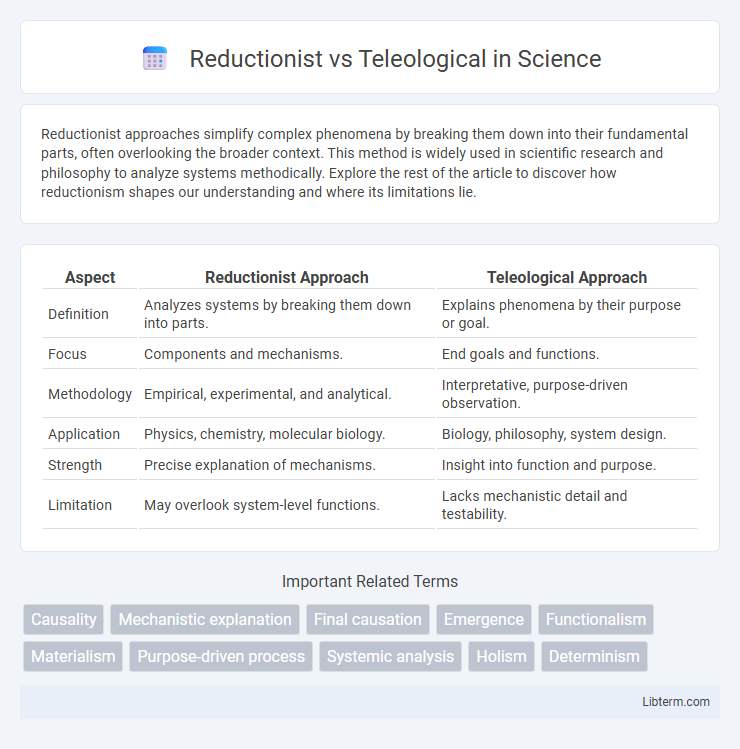Reductionist approaches simplify complex phenomena by breaking them down into their fundamental parts, often overlooking the broader context. This method is widely used in scientific research and philosophy to analyze systems methodically. Explore the rest of the article to discover how reductionism shapes our understanding and where its limitations lie.
Table of Comparison
| Aspect | Reductionist Approach | Teleological Approach |
|---|---|---|
| Definition | Analyzes systems by breaking them down into parts. | Explains phenomena by their purpose or goal. |
| Focus | Components and mechanisms. | End goals and functions. |
| Methodology | Empirical, experimental, and analytical. | Interpretative, purpose-driven observation. |
| Application | Physics, chemistry, molecular biology. | Biology, philosophy, system design. |
| Strength | Precise explanation of mechanisms. | Insight into function and purpose. |
| Limitation | May overlook system-level functions. | Lacks mechanistic detail and testability. |
Understanding Reductionism: Core Principles
Reductionism centers on breaking complex phenomena into simpler components to understand the whole, emphasizing causal relationships and mechanistic explanations. This approach assumes that all systems can be fully explained by their parts and interactions at the most fundamental level. By isolating variables, reductionism facilitates detailed analysis but may overlook emergent properties arising from complex systems.
Teleological Perspectives: The Role of Purpose
Teleological perspectives emphasize the role of purpose and intentionality in explaining phenomena, suggesting that processes and entities act with specific goals or ends in mind. This approach contrasts sharply with reductionist views by focusing on the function and final causes rather than merely on underlying components or mechanisms. In biology, teleology often appears in discussions about the adaptive significance of traits, where purpose-driven explanations illuminate how features contribute to survival and reproduction.
Historical Roots of Reductionism and Teleology
Reductionism originated in the scientific revolution of the 17th century, with thinkers like Rene Descartes emphasizing the analysis of complex phenomena into simpler components to understand natural processes. Teleology, rooted in Aristotelian philosophy, interprets natural phenomena based on purpose or final causes, positing that entities act towards inherent goals or ends. The historical dichotomy between these perspectives reflects a shift from classical metaphysical explanations to modern mechanistic science emphasizing empirical and analytical methods.
Key Differences Between Reductionist and Teleological Thinking
Reductionist thinking breaks complex phenomena into simpler components to understand the whole system, emphasizing causality and mechanistic explanations. Teleological thinking interprets phenomena by their purposes or goals, focusing on the end results and functions rather than just causes. Key differences lie in reductionism's focus on parts and causal processes versus teleology's emphasis on purposeful outcomes and holistic understanding.
Famous Reductionist Theories in Science and Philosophy
Famous reductionist theories in science and philosophy include mechanistic materialism, which explains natural phenomena solely through physical processes and interactions, and the molecular biology reductionism that breaks down biological functions into genetic and chemical components. In philosophy, logical atomism reduces complex propositions into simpler, atomic statements to clarify meaning and truth conditions. These theories emphasize understanding systems by analyzing their most basic parts and causal mechanisms.
Teleology in Biological and Social Sciences
Teleology in biological and social sciences emphasizes purpose-driven explanations, interpreting natural phenomena and human behaviors as goal-oriented processes. In biology, teleological perspectives consider evolutionary adaptations as outcomes shaped by functional needs, while in social sciences, teleology analyzes social structures and actions through intentionality and collective objectives. This approach contrasts with reductionist methods by prioritizing holistic understanding over isolated components, highlighting the significance of ends and purposes in complex systems.
Strengths and Limitations of Reductionism
Reductionism excels in breaking complex systems into simpler components, enabling detailed analysis and replication in scientific research. However, its limitation lies in overlooking the emergent properties and holistic interactions within biological, psychological, or social systems. This approach may miss broader teleological explanations that consider purpose and goal-directed behavior in natural phenomena.
Critiques and Challenges to Teleological Explanations
Teleological explanations face critiques for their reliance on purpose-driven reasoning, which can lead to circular arguments and hinder empirical testing. Critics argue that attributing outcomes to inherent purposes often disregards complex causal mechanisms and evolutionary processes. This poses challenges in scientific disciplines where observable, measurable causes are preferred over inferred final causes.
Integrating Reductionist and Teleological Approaches
Integrating reductionist and teleological approaches enhances scientific understanding by combining detailed mechanistic analysis with goal-directed explanations of biological systems. This synthesis allows researchers to uncover not only how components function individually but also why they collectively contribute to adaptive outcomes, bridging molecular detail with functional purpose. Advances in systems biology exemplify this integration, revealing complex interactions that underlie organismal behavior and evolution.
Modern Implications: Reductionism vs Teleology in Contemporary Debates
Reductionism emphasizes analyzing complex systems by breaking them into simpler components, influencing modern scientific methodologies and encouraging detailed empirical research. Teleology, which interprets phenomena based on purpose or goal-directedness, persists in contemporary ethical discussions and debates on human behavior, cognitive science, and artificial intelligence design. Current interdisciplinary dialogues often balance reductionist explanations of mechanisms with teleological perspectives to address complex questions in biology, philosophy, and social sciences.
Reductionist Infographic

 libterm.com
libterm.com